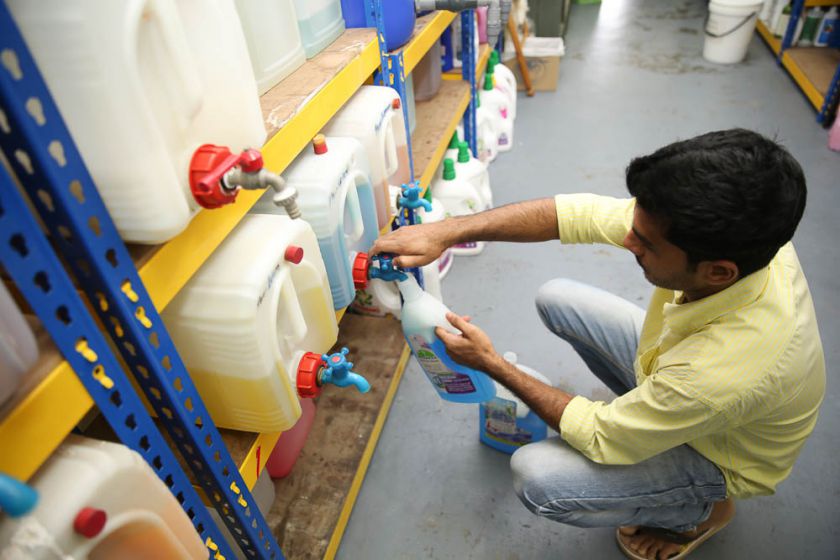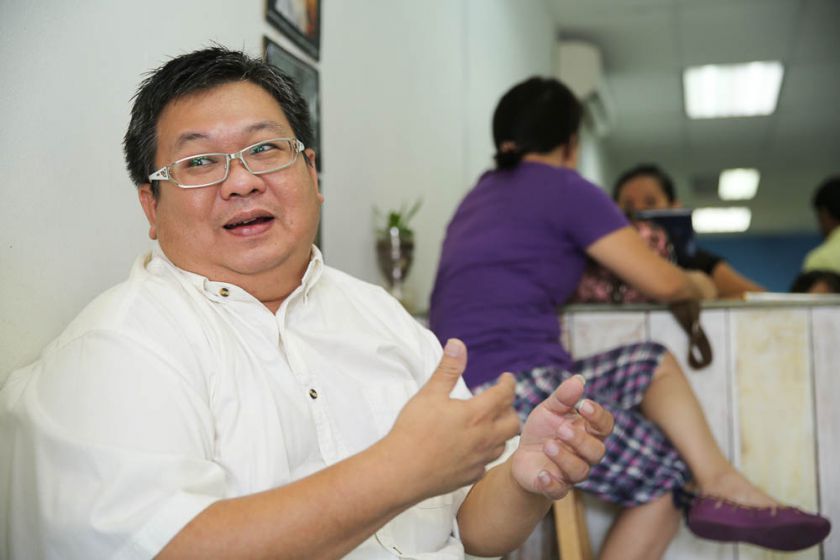KUALA LUMPUR, Aug 3 — In a society addicted to convenience, it is intriguing to see people queuing up with bags of empty plastic bottles to get them filled with detergent.
After all, who has the time these days?
Two decades ago, it was not such a rare sight. Children would be whizzing past in rugged BMX bicycles with clanking tin cans to have them refilled with kerosene and middle-aged women would walk to their neighbourhood restaurants to tapau lunch with their three-tier tiffin carriers.
This is precisely what Wilson Lai hopes to regenerate, to get people to reuse perfectly good items that may otherwise end up in the garbage dump.
Hoping to start a trend, “BYOB: Green Concepts”, a three-year-old social enterprise, has created quite a buzz in the busy middle-class suburbs of Damansara Kim and Bandar Mahkota Cheras.
BYOB is the brainchild of industrial and household detergent manufacturer Lai, who is trying to play his part in tackling the toxic issue of global waste by transforming the general apathy towards the environment.
“I asked myself what can I do that I didn’t have to invest much in. Since I already owned a related business it wasn’t difficult to get started,” said Lai, who began supplying cleaning detergents in bulk back in 1994.
Aptly named after the age-old “bring your own bottle” in reference to booze, the 43-year-old decided it was time to get cracking on the idea on when he chanced upon a friend lugging sacks full of plastic bottles and containers to be delivered to scrap dealers.
“He said he was going to take it to the recycling centre, and I asked him if he was aware that pulping plastic bottles doesn’t reduce the impact on the environment.
“But he was not in mood to listen because the containers were piling up in his living room and he didn’t want to feel guilty by casually junking in a bin,” said the good-natured Lai.
Already an owner of a detergent-making factory, it was fairly easy to revamp part of his core business to produce the environment-friendly liquid detergent only sold at BYOB.
“People throw away bottles like they are free, when they are not. It costs more than RM2 to make the Dynamo bottle... it is still usable, but you throw it away,” he said.
Not all types of plastic are recyclable either. But when it is reprocessed in recycling centres they are made into products of inferior quality while those that are discarded end up in already congested landfills.
There are seven codes to distinguish types of plastic for recycling; in reality, only two — polyethylene terephthalate (PET) is used for synthetic fibres and water bottles and high density polyethylene (HDPE) used for jugs, bottle caps, water pipes — are routinely recycled.
“It is common knowledge that it takes ages for plastic to disintegrate,” said Lai, noting that in the US, post-consumer plastic waste for 2008 was estimated at 33.6 million tonnes with only a fraction 6.5 per cent recycled and 7.7 per cent combusted in waste-to-energy facilities.
In Malaysia, according to the National Solid Waste Management Department’s data from 2005, plastic waste is ranked the second highest with 24 per cent out of the total waste disposed trailing after food waste at 45 per cent, with a low recycling rate of only five per cent annually, which is further hampered by manpower and collection costs.
As of 2010, Malaysia’s solid waste was estimated to be at 941,840 tonnes, roughly enough to fill 470 football fields.
The rest ends up in landfills where it may take up to 1,000 years to decompose, and potentially leak pollutants into the soil and water.
“It’s estimated that there are also 100 millions tonnes of plastic debris floating around in the oceans. Now you know why it is so difficult to locate MH370,” jibed Lai, referring to the arduous search mission in the wild waters of the Indian Ocean for the jetliner which disappeared mid-flight on March 8.
“When it happens to degrade it just becomes plastic dust and enters our ecosystem, and we ingest it. Does it make sense, then, to throw it away something you paid for, after just one or two uses, when it could, actually, last you your entire lifetime?”
If the data is anything to go by it is an indication that awareness on “what happens to our waste” is problem said Lai, which is the underlying reason for insisting on refilling used bottles.
“Stuff on the shelves are pollutants but our product is the solution. One customer pointed out that it’s like getting a Mercedes for the price of a Proton,” he joked.

The holistic approach not only gets one comparatively cheaper and quality-controlled detergent compared to those on supermarket shelves, but also imparts the true notion of reducing waste.
Understanding the mammoth task of inculcating a habit, Lai decided to roll out the first BYOB store in the bustling neighbourhood of Bandar Mahkota Cheras, Kajang in 2011, close to where he lives.
But it took gumption as the entrepreneur said the social initiative has not been a profitable venture, although news of it caught on like wild fire.
“Many more asked to open but it just doesn’t make sense for us because that would kill our core business faster.
“This is the dilemma as more stores open up. I have to educate them on the business, the production of the detergent uses the factory hours, the labour — for free. The more BYOB grows, the faster we die,” he said.
While there were ideas to rope in external resources to fund the business, Lai said that could affect quality control.
“We are seeking more ways to make this thing sustainable,” he said, adding that BYOB has been listed with the British Council’s Social Enterprise Award to build its network and hopefully gain recognition.
With a commercial factory to manage and a young family to tend to, Lai divides what’s left of his spare time spreading the word on BYOB through Facebook.
To ensure cost is not transferred to customers, the purveyors of the BYOB shop keep furnishing to a bare minimum.
“No renovation is allowed. The most you can do is to paint the walls and fit in shelves so that cost of the renovations will not be translated to the customer. Anything DIY (do-it-yourself) is welcomed.”
Despite minimal marketing and a rustic concept, BYOB has grown into 10 stores nationwide and their detergents are competitively priced between RM1.50 for dishwashing liquids to RM20 per litre for fabric cleaners.
BYOB also carries a niche line of natural chemical cleaners certified in Australia, which cost a tad bit more than the regular range, but far less than commercially available products, and an extensive range of cosmetics and personal care is also in the pipeline.
Three years on, Lai and his team have “rehoused” over 500,000 bottles from ending up in the municipal solid waste stream and been awarded for it by a global movement called Think Beyond Plastic as the Most Promising Emerging Business 2013 for its innovative and safe alternative.
“You just take, take and take and no one returns anything. If this goes on, it is going to become an ugly, ugly world. If we run out of resources, money is just coloured paper.
“When the last river is poisoned and the last tree is chopped down only then you will realise you can’t do much with money but people still don’t learn, everyone just want convenience.
“That is the reason at BYOB we want our customers to understand that our only shareholder is Mother Nature.”
Find out more about BYOB: Green Concepts at BYOB Malaysia's Facebook page.






















